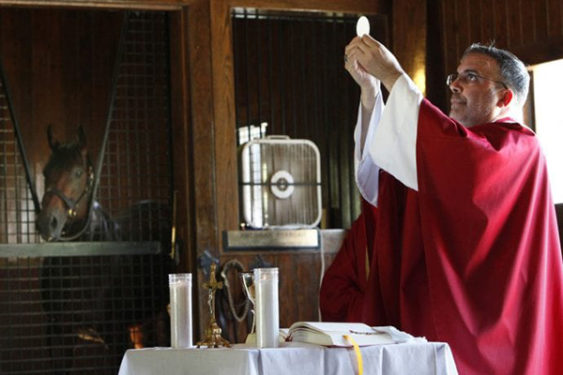
By Christopher White, The Tablet’s National Correspondent
NEW YORK – Drawing on Pope Francis’s 2013 letter, “The Joy of the Gospel” – widely considered the blueprint for his papacy – one Kentucky diocese has released a new pastoral plan seeking to evangelize those on the margins of society.
Launched on Pentecost Sunday, “A Community of Missionary Disciples: A Pastoral Plan for the Diocese of Lexington,” aims to find local ways to “to promote a Church that is joyful, attentive to people on the peripheries and ever centered on Jesus Christ.”
The plan seeks to strengthen collaboration between parishes, deaneries, and diocesan officials and identifies five key areas of focus: Evangelization, sacramental ministry, unity/communion, faith formation, and stewardship.
“In a time of great division in society and a deeply entrenched individualism, we are called to form a life-giving community that recognizes its diversity but comes together in unity around the table of God’s Word and the table of the life-giving presence of Jesus in the Eucharist,” writes Bishop John Stowe in the prologue to the document.
Since being made a bishop in 2015, Stowe, a Franciscan, has become one of the most vocal champions of Pope Francis among the leaders within the U.S. hierarchy.
The document calls for a new emphasis on encountering the diverse communities within the diocese of central and eastern Kentucky, among them being “divorced, elderly, singles, African-Americans, Hispanics, Congolese, Filipinos, Koreans, Indians, Nigerians, young adults, newly married, young families, youth, ‘nones,’ those with different socio-economic status, LGBTQ+, those with disabilities, those struggling with mental illness or addictions, etc.”
“Whether in the inner city or the rural and mountainous parts of our diocese, we do not have to go far to find the peripheries. It is where Christ ministered and where the Church must minister,” the document states. “The peripheries may include the economically disadvantaged, may include racial minorities, may include people of other faith traditions and no faith, may include people with differing sexual orientations – the peripheries are those who are overlooked, who are excluded, whose voices are under-represented.”
Although the city of Lexington is known as a commerce and education hub, much of the surrounding rural areas of the Appalachian diocese are impoverished, with Catholics constituting only three percent of the total population within the diocese’s 50 counties.
Catholics within the diocese are asked by the pastoral plan to “transcend divisions between Bluegrass and Mountain parts of the Church” and “engage the immigrant and refugee membership of our Church,” in order “to be able to extend our desire for community beyond ourselves.”
The plan, which was drafted by a 10-person committee of priests, religious sisters, and laypersons, will be reviewed in five years, and specifically states that the intended goal is not to close parishes or programs, but to revitalize the ongoing ministries within its 59 parishes.
Among the goals detailed in the 24-page document are the creation of a peace and justice commission, training for music ministry, improved preaching, programs to support family unity, greater support for multilingual families, improved catechesis, and implementing Pope Francis’s 2013 encyclical Laudato si’, which calls for greater care for creation.
“At Pentecost, the newly empowered apostles discovered a people who shared one faith but spoke a variety of languages and came from diverse parts of the world,” the document states. “The Church of the Diocese of Lexington likewise recognizes this diversity in the people of God. The kingdom that Jesus preached is all-inclusive, it is available to everyone and it requires conversion on the part of everyone to be able to enter.”
“It is my hope and fervent prayer that our local Church will embrace this vision and commit to the transformation of society that is at the heart of the Gospel call to conversion,” said Bishop Stowe.
